Graham Reid | | 9 min read
.JPG)
In a year full of the unexpected, the new album Inner World still surprises. It features the voice of the Dalai Lama speaking words of wisdom and compassion and placed against relaxing soundbeds.
The album Inner World, released on The Dalai Lama's 85thbirthday, has already picked up excellent advance notices, perhaps because in a troubled time his thoughts speak to something deeper within is. A better part of ourselves.
The album -- reviewed here -- is the brainchild of two expat New Zealanders Junelle and Abraham Kunin, so we spoke to them about how this happened and what it might mean . . .
First of all congratulations, this is a lovely project. I'll ask you about how it came together in a moment but . . . The Guardian picked up ‘Compassion’ as a single of the week alongside all the young hip-hop releases. Could you ever have expected that?
Abraham:Thank you for the kind words Graham. We’re so grateful for the support and warmth this project has received internationally. We created the music with the intention of it being accessible to as many people as possible. It’s really rewarding to have it appear in a context like that and go beyond genre expectations.
The background to this then? I understand it began as an idea five years ago which grew into a project, is that right?
Junelle:I first suggested the idea to the Dalai Lama’s office years ago after an online search for something pairing his teachings with music to serve as a stress relief at work. I was surprised nothing already existed. My idea was initially turned down. Then I had a dream where he said to ‘ask me directly’. I got the chance to during a 2015 trip to India via a letter I gave to one of his personal attendants. I was told that after reading it, His Holiness waved it in the air and said, ‘This will benefit many, many, many people! Book her in!’ Two days later, there I was, with a list of mantras and a dictaphone, ready to record.
I was amazed by His Holiness’ response. I thought I might need to explain the benefits of his participation in such a project, but he understood perfectly. “Music can help people in a way that I can’t,” he said. “Music has the potential to transcend our differences. It can return us to our true nature of good-heartedness.” It was beautiful. At this point he was leaning towards me, on the edge of his seat, so passionate, so clear – he was persuading meabout how important music is!” Thatmoment at thatmeeting, is what gave me the strength to persevere through the many challenges we would face in bringing the album to fruition.
I assume you had to ask the Dalai Lama's blessing for this? How did he receive the idea when it was put to him. I guess he is approached frequently to lend his name to projects, but this is actually his debut album, isn't it? At 84!
Junelle: His Holiness has said a number of times he trusts me. I was fortunate to have hosted him while he was here in New Zealand on a number of occasions. I had the opportunity of spending a lot of time with him personally, with our days starting at 4am. By the time I had asked him about the album, I had hosted him on three NZ Tours, and visited him in Australia and India a number of times too. We built a connection of warmth and care over the years. He feels more like family, to me, if I’m honest. Someone I care for, and feel protective of like family. I’m very close to some of his closest ‘attendants’, they’re lovely monks who all know me well, and they’ve become a part of my extended family.
Upon reading my letter His Holiness was absolutely clear - he was doing this. He has maintained that commitment and generosity of time and availability throughout the whole journey. I always put this down to, that it fulfills his kaupapa. His entire wish to serve as much as he can. Being combined with the powerful medium of music fulfills this wish even further.
Abraham:This is in his words the first time he’s ‘combined with the medium’ of music. The release date will be his 85th birthday.
Did you send him a sample of a track initially or to get his feedback once permission was given, or did he leave it very much to you?
Abraham:It was daunting to receive this amount of trust. Junelle came home with a dictaphone full of spoken mantras and teachings, and we had to go from there. We had offered the Dalia Lama a copy of Junelle's EP a couple of years earlier in person, and the track she had dedicated to him (‘Refuge’) was in some ways sonic DNA for this album. On this album’s journey, we have been back and forth with his office a lot, but the music itself we were really trusted with. Their response has been positive and they have been supportive of what we created.
Of course this was never going to be a collection of clubland bangers, but were the gentle ambient music and soundscapes determined by the meanings of his words or simply by the sound of his voice?
Abraham:I think both those aspects informed the sound of the album for sure. His intention, and his vocal timbre and delivery. If there was any overarching influence though, it was just to make this work something that was comforting, healing, and inclusive, a listening experience as possible. Something sincere and egoless. For anyone open to it.
Each track has its own journey and its own lessons. Rather than being too cerebral, I approached the project trying to be open and receptive, searching for a symbiotic tonality for each mantra or discourse.Sometimes this came quickly, and stayed focused from there. Sometimes it would take 6 versions of the song to finally carry the right emotional resonance, where the feeling went deep enough. And when Junelle felt it had what we were looking for.:)
Anoushka Shankar is someone I have interviewed and long admired for the diversity of her music, so how did she come into this project? Did you know her previously? Did you guide her by giving her other music you had already prepared for this or maybe just the Dalai Lama's words as a sample?
Abraham: She’s somebody we’re both fans of, but I’d have to say the collaboration came through Junelle’s vision, and unshakeable fortitude to just reach out. She can speak more to the reasoning behind having Anoushka on this particular track. In terms of the process, I’d found the bones for this one a few months earlier. Junelle suggested Anoushka could perhaps play ‘from the perspective of a mother’. I sent her some music which is more or less what you hear on the album minus her sitar.
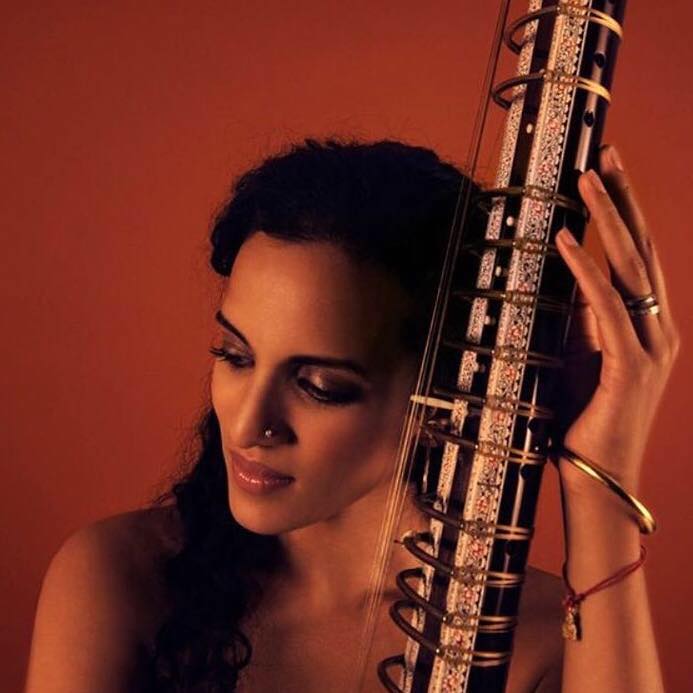 What she played was so evocative though, we ended up stripping some parts away to really give it room. As you’d imagine, I’ve listened to this a fair bit through the steps of finishing this album, and there are still fresh nuances which come up in her playing every time I hear it. I’ve only dipped my toes, but Hindustani classical music is a deep ocean.
What she played was so evocative though, we ended up stripping some parts away to really give it room. As you’d imagine, I’ve listened to this a fair bit through the steps of finishing this album, and there are still fresh nuances which come up in her playing every time I hear it. I’ve only dipped my toes, but Hindustani classical music is a deep ocean.
Junelle: Anoushka, she was a dream to get to collaborate on this. She was also the only artist we deemed appropriate, for a number of reasons. In addition to exceptional on her instrument, the kaupapa of her instrument and music is inherently spiritual, so there was a really nice synergy there. Additionally, Anoushka is of Indian descent, so it was a lovely way to pay homage to India, the birthplace of The Buddha, and the country who have taken in Tibetan’s in exile and of course The Dalai Lama. Anoushka is also a Mother, and this track is paying homage to Mothers. We asked she plays from the perspective of a Mother. Lastly, she is a force of good, especially for women's rights. I wanted her presence to Inspire women.
Something of your musical backgrounds please. Were you rock kids as teenagers, into jazz or ambient music, trip-hop or . . .?
Abraham:My earliest musical memories are Sam Cooke, Paul Simon, Ray Charles, a lot of Stax and Motown. Then when I was about 5 or 6 my sister Rebecca got me into Prince. He’s a figure like Coltrane to me, one of those unreachable ideals. The Buddhas are considered perfect embodiments or emanations of a particular quality. I think some musicians are like that too, the highest realisation of themselves. Over the next few years, she gave me a walkman with cassettes of PJ Harvey, Nine Inch Nails, Public Enemy. Teen years were more Rage Against the Machine, System of A Down, Bone Thugs, Dr Dre. Then jazz came a little later. I’ve been totally obsessed with music for as long as I can remember. The local scene was really influential too. I don’t think we appropriately honour our musical whakapapa over here. Seeing The Bleeders or Goodnight Nurse play at a packed Kings Arms, or Tourettes and Tyna in rap battles, those gigs made me know this was what I wanted to do with my life. Those are the artists who made it tangible. Sorry I don’t know if any of that answers the question! I guess I’m just looking to feel something from music. Genre isn't a factor as much as the intention from the players, the vibe from the production, all that stuff which you respond to subconsciously.
Junelle:Being Maori, music has been an integral part of my life, as well as growing up singing in Church. In later years I would happily move into the jazz sphere and have been in that space for more than a decade now. Not long after Abraham and I got together he produced my one and only recorded body of work Just This Sky.Turning my acoustic guitar tunes into electronic ambient tracks. I also grew up loving the r'n'b artists of the 90’s in particular. Many of whom our business partners for this work, LA Reid and Charles Goldstuck brought to the world i.e. Whitney Houston, Mariah Carey and Alicia Keys to name a few. So that has been an added highlight to this journey.
This is very much a project born of and realised by New Zealanders, isn't it? How so?
Abraham:It was composed, recorded, largely performed, mixed (Aaron Nevezie), produced, and delivered by New Zealanders. The majority of the music was written and recorded in bedroom studios in Sandringham, Mt Roskill, Swanson, and Massey. It’s funny because there’s the full gamut of fidelity and location in this album. Hotel rooms in Salisbury, through to some of better studios in the world like Aaron’s The Bunker Studio in Brooklyn. In the end, whatever carried the kaupapa of the album most purely, whatever felt right, is what ended up on the album. For the most part though, this was made on hilariously humble means and resources. I think I counted 20 New Zealand musicians who contributed performances through the making of the album.
Junelle:This is true. Conceived while sitting in my corporate office in Britomart. And mostly made in NZ too, at our various homes over the past years. We very consciously included our community as much as we could, although I should differentiate. There were no favours too, we asked people because they were skilled as well as had aligned hearts.
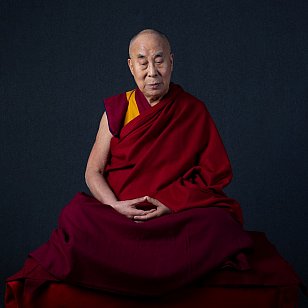 Would it be fair to say that in this time of haste and fear and division that an album like Inner World is actually necessary to remind us of compassion, healing and our shared humanity?
Would it be fair to say that in this time of haste and fear and division that an album like Inner World is actually necessary to remind us of compassion, healing and our shared humanity?
Abraham: We can only hope that it helps. We created this, and we fought through years of obstacles holding onto the belief it could help people. It certainly feels like a time in the world where a lot more empathy is needed. I don’t think there’s ever going to be a time when compassion and interdependence isn’t crucial, but right now those of us, myself included, living in positions of privilege need to take a hard look in the mirror and think about what we can do to contribute in a broader sense. As His Holiness so eloquently put it, “All injustice is based on too strong a sort of concept of we and they, me and them.”
What would be your hopes for this album at this troubled time in the world?
Abraham: There isn’t time to get into it without a much longer korero, but believe me when I tell you, Junelle is the hero of this story. So it makes sense to quote her heartfelt wish “that this album creates, even for a moment, a sense of safety in times of anxiety and fear, giving people the courage to never give up hope.”
.
 You can hear Inner World at Spotify here. The CD edition with booklet all the art and lyrics etc. is available through Southbound Records in Auckland. See here.
You can hear Inner World at Spotify here. The CD edition with booklet all the art and lyrics etc. is available through Southbound Records in Auckland. See here.

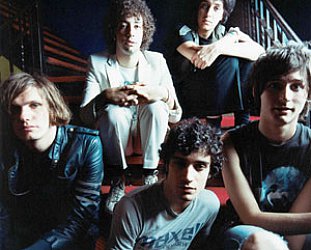
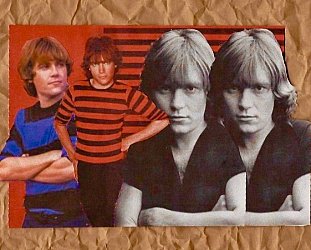
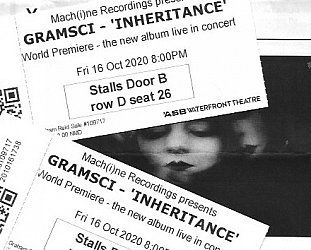
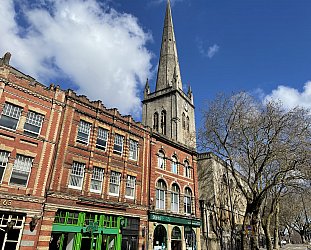
post a comment